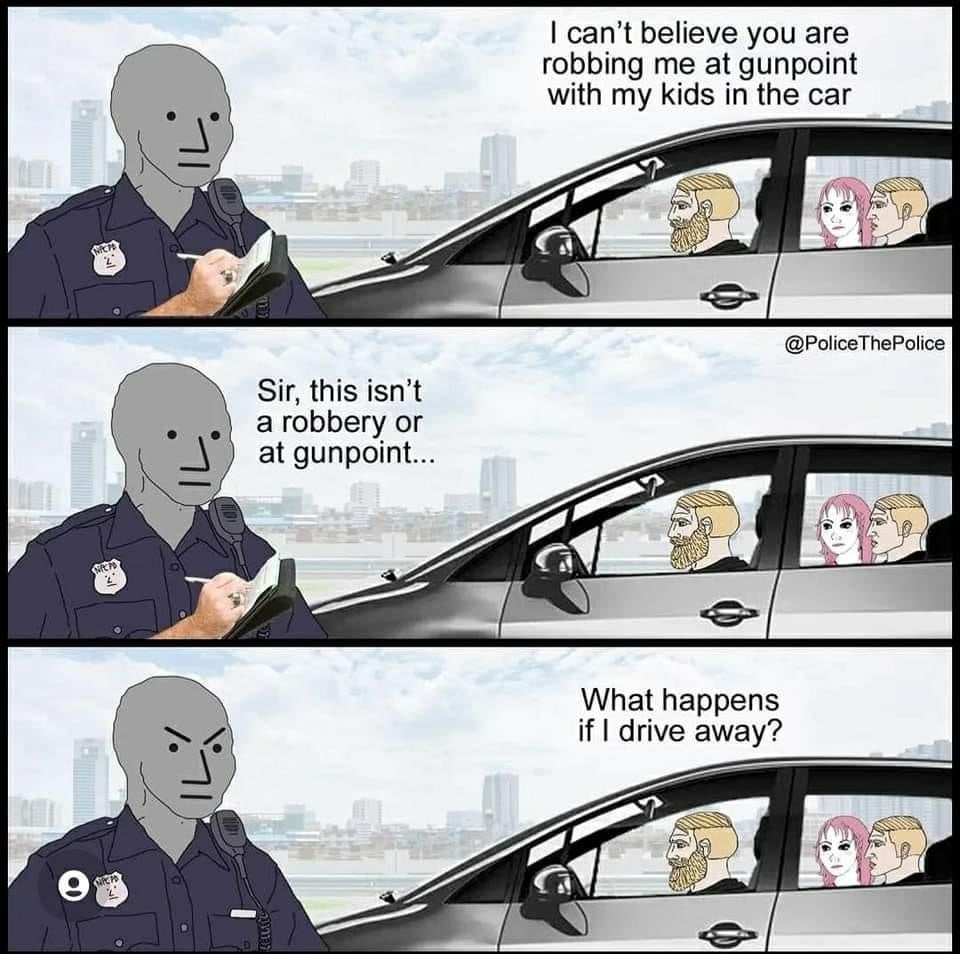this post was submitted on 24 Sep 2024
300 points (78.8% liked)
US Authoritarianism
868 readers
206 users here now
Hello, I am researching American crimes against humanity. . This space so far has been most strongly for memes, and that's fine.
There's other groups and you are welcome to add to them. USAuthoritarianism Linktree
See Also, my website. USAuthoritarianism.com be advised at time of writing it is basically just a donate link
Cool People: [email protected]
founded 9 months ago
MODERATORS
you are viewing a single comment's thread
view the rest of the comments
view the rest of the comments

no, it's not something good, look at Honkong, Tibet, Russia, Iran, Belarus, etc.
Are you advocating for multiple, competing armed groups in the US?
Generally, a monopoly on the legitimate use of force is considered a cornerstone of "government".
I don't like the government, I'm an anarcho-syndicalist. that means different syndicates would be armed and they'd probably be competing, so yeah, I'm advocating for multiple armed forces
Cool. That's a coherent political philosophy, you just don't normally run into people arguing for more legitimate use of violence.
Personally, multiple armed entities sounds like the worst aspects of government without the redeeming aspects.
I'm the breed of anarchist more concerned with involuntary power hierarchy than specific forms of said dynamic, like class. Reducing the number of groups who can coerce others into doing stuff isn't aligned with more legitimate armed factions.
I voted for my sherrif, so I'm more okay with him pointing a gun a me than your trade union, whom I didn't vote for. It's not wholly voluntary because I didn't get to vote for "disarm the sheriff and make the fire fighters the principle law enforcement group", so it's far from perfect, but at least I know who's holding the gun.
personally I think, that multiple armed syndicates would be less likely to actually use that violence, since war is not only unprofitable in every aspect but they also couldn't legitimize the violence. I think, that a monopoly doesn't have any reason to provide quality, in this case the quality being how "legit" the use of violent force is. and we see this all around the world, states don't only use violence to protect people, but against entities they just don't like (like the lgbt community in russia or china for example) and even if a state intended to just use violence in a "moral" way, a monopoly on it means that I can't even use it against a police officer going rogue for example
I can see the rationale, but I disagree.
I think it's difficult to make a good assessment because every situation involving multiple legitimate armed factions that's come about has had a lot of other Context around it that makes it hard to know if what you're seeing is because of the factions, or because of the context.
That being said, the vast majority of cases I can think that involve multiple armed factions seem to devolve less into rational actors minimizing conflict to reduce cost, and more into rational actors executing violence to maintain control of resources or impose conformance with their beliefs.
Violence is often very profitable. It gives you control over resources you didn't have, and compels people to cooperate with your wishes.
In the absence of a monopoly on violence, all of it is just as legitimate. Each group sees their use of force to further or protect their interests as legitimate and others as illegitimate. This can manifest as blood fueds, vendettas, communal violence, or the myriad forms of organized crime.
I totally agree that the leviathan, which is a much cooler word for the entity with a violence monopoly, has no reason to offer overmuch quality to their violence. The leviathan only wants to use force to perpetuate their monopoly on force.
I'd argue that the violence required to maintain the status quo is less than what competing factions would exert trying to establish themselves.
While there are plenty of states doing horrible things, there are plenty that are relatively benign, and even the horrible ones are, on the historical scale, less common and more mild.
The most docile areas seem to me to be ones with a single legitimate violent actor, and pro-social systems in place to reduce the need for cooercion.
I don't think we can ever entirely get rid of the state, since at some point people will form a structure to manage or, at least document, the society they've built, and a state by any other name is still a state.
But we can wither it away if we make sure to replace it with non-coercoercive social replacements instead of leaving a vacuum like the "starve the beast" folks want.
As the smallest nit, the states monopoly on violence isn't to be the sole doer of violence, but to be the sole arbiter on the legitimacy of violence.
In a perfect system, you fighting back against the rogue cop is legitimate because the state legitimizes your use of force.
Practically, we usually only see that legitimazation happen with stand your ground laws and castle doctrine, and less police issues because the police are "special", but that's aside from the lofty theory.
Sounds like a nightmare to me, but it's politically coherent so /shrug